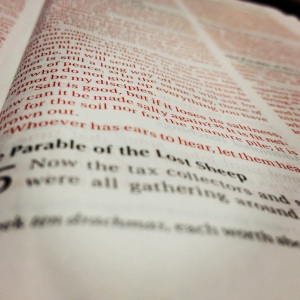I talk about the Bible a lot. So, it stands to reason that I also hear people talk about the Bible a lot as well. One of the phrases I hear often in such settings is some variant of the following:
“I just believe the Bible.”
or
“I’m just telling you what the Bible says.”
Statements such as these imply that our personal opinions, context, background, worldview and all such things are divorced from our reading of the Bible. We approach the Scripture without bias or presupposition, and objectively make pronouncements about the meanings of the text.
The issue with this is simple: That is not possible!
We are human beings. We live in a particular context, have a particular worldview, and that colors our interpretation of the Bible.
And let’s be even more honest, we are all interpreting the Bible. There is no divine manual of interpretation that fell from the sky that gives us a clear ‘this is what it means’. We all interpret the Bible, and that interpretation is an opinion. This opinion may be shared by some [and not by others], but that doesn’t make it less of an opinion.
To claim that we somehow stand above the fray and offer an unbiased, unopinionated interpretation just isn’t accurate. Or honest. That claim is seeking unquestioned authority and obedience to our interpretations. And, some opinions/interpretations are better than others. Some are more true to the text. But they are still interpretations.
That’s the key, actually. The Bible must be interpreted. We wrestle with what the Bible means–when it was written and now–because we want to live as true to the vision and way that are set out there as we possibly can.
But let’s be honest, none of us approaches the Bible as a clean, objective slate. We bring our experiences, our views, what we’ve heard or been taught…we bring a mixed bag of bias and opinions that make us anything but completely objective.
There is much wisdom in these words from Thomas Talbott, Professor Emeritus of Philosophy at Willamette University:
“We don’t read the Bible the way it is; we read the Bible the way we are.”
He is not disputing the claim that there is truth to be discovered, or that some readings of the text aren’t better or more accurate than others. He is disputing the idea that we can just tell people ‘what the Bible says’ without making interpretations, which are filtered through our views, opinions, and ideas.
This wrestling with the text and its meaning is one of the things I love about the Bible and being in community with others. The Bible, though more, is not less than an invitation to carry on an ancient conversation about the things that matter most.
Read it.
Study it.
Discuss it.
Immerse your life in it.
But let’s not assume we somehow offer an unbiased interpretation.

Love the write up….Still laughing that you had a Cruzan Rum commericial under your blog!
LikeLike
Ben-
Ha! That’s funny…I didn’t notice. I bet you read on a phone or ipad, right? They place ads on those. Too funny. Thanks for reading!
LikeLike